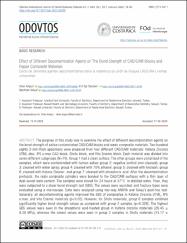Effect of different decontamination agents on the bond strength of CAD/CAM blocks and repair composite materials
Citation
Kopuz, D; Sancak, Eİ; Tekçe,N. Effect of different decontamination agents on the bond strength of CAD/CAM blocks and repair composite materials (2024). Odovtos International Journal of Dental Sciences, 26(1); 76-85.Abstract
The purpose of this study was to examine the effect of different decontamination agents on the bond strength of saliva-contaminated CAD/CAM blocks and repair composite materials. Two hunderd eighty 3-mm-thick specimens were prepared from four different CAD/CAM materials: Katana Zirconia UTML disc, IPS e.max CAD block, Shofu block, and Vita Enamic block. Each material was divided into seven different subgroups (N=70). Group 1 had a clean surface. The other groups were comprised of the samples, which were contaminated with human saliva: group 2: negative control (non-cleaned); group 3: cleaned with water spray; group 4: cleaned with 70% ethanol; group 5: cleaned with Ivoclean; group 6: cleaned with Katana Cleaner; and group 7: cleaned with phosphoric acid. After the decontamination protocols, the resin composite cylinders were bonded to the CAD/CAM surfaces with a thin layer of dual-cured resin cement. The samples were stored for 24 hours at 37°C in distilled water. Then, they were subjected to a shear bond strength test (SBS). The values were recorded, and fracture types were evaluated using a microscope. Data were analyzed using two-way ANOVA and Tukey’s post-hoc test. Generally, all decontaminating agents improved the SBS of composites to Katana Zirconia UTML, IPS e.max, and Vita Enamic materials (p<0.05). However, for Shofu materials, group 6 samples exhibited significantly higher bond strength values as compared with group 2 samples (p=0.026). The highest SBS values were seen in the phosphoric acid-treated group in Katana zirconia materials (26.45 ± 9.38 MPa), whereas the lowest values were seen in group 2 samples in Shofu materials (13.17 ± 3.40 MPa). Each decontaminant agent improved the bond strength of composites to the contaminated CAD/CAM materials. If saliva is not cleaned before adhesive procedure, SBS values may decrease. All decontamination agents can be used safely on zirconia, lithium-disilicate glass-ceramic, hybrid ceramic, and polymer-infiltrated ceramic surfaces.
Source
Odovtos International Journal of Dental SciencesVolume
26Issue
1URI
https://revistas.ucr.ac.cr/index.php/Odontos/article/view/56839https://doi.org/10.15517/ijds.2023.56839
https://hdl.handle.net/20.500.12780/780


















